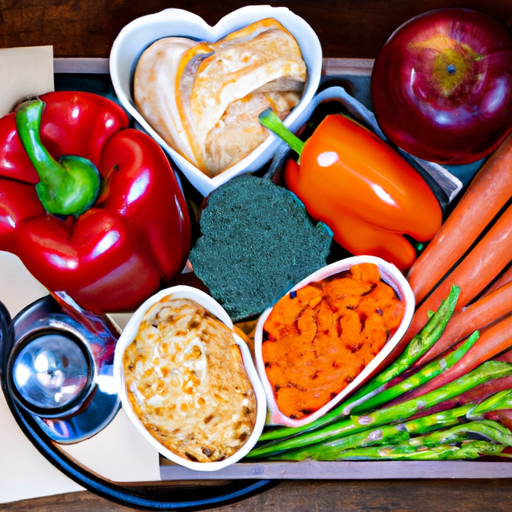When it comes to taking care of your heart, diet plays a huge role. Eating the right kinds of food can help keep your cardiovascular system healthy and strong. Today we’ll look at some nutritious foods that are good for your heart health, and discuss how you can incorporate them into your meals.
1. Heart Healthy Foods: Nourishing Your Cardiac System
Keeping your heart healthy is essential for maintaining a healthy lifestyle. One way to do that is to make sure your diet is full of foods that are good for the cardiac system. Here is our recommendation of heart healthy foods to nourish your cardiac system:
- Fruits: oranges, strawberries, blueberries, bananas, apples, and kiwis.
- Vegetables: carrots, spinach, squash, sweet potatoes, tomatoes and broccoli.
- Grains: oats, whole wheat, quinoa, barley, and brown rice.
- Beans and Legumes: black beans, kidney beans, peas, chickpeas, and lentils.
- Nuts and Seeds: chia seeds, walnuts, almonds, pumpkin seeds, flaxseeds, and sunflower seeds.
These foods are packed with vitamins and minerals and are great for your heart health. Eating fruits and vegetables are especially important, as they are rich in antioxidants which can help prevent heart-related diseases. Furthermore, eating grains, beans, nuts, and seeds on a regular basis can help reduce your risk of heart disease and keep your cholesterol levels in check.
2. Boost Your Cardiac Health: Simple Changes for Better Nutrition
When it comes to keeping your cardiac health in peak condition, you don’t have to go on an extreme nutrition plan or hire a nutritionist to reap the benefits. In fact, by making a few changes to your diet, you can take big steps towards improved overall health. Here are a few easy steps to try:
- Eat more fresh vegetables – Be sure to include leafy greens, green peppers, broccoli, asparagus, onions, sweet potatoes, cauliflower and tomatoes into your plates. Not only are they incredibly nutritious, they are also low in calories!
- Start your day with whole grains – Start your day with a substantial breakfast, composed of whole grains such as oat meal, quinoa, or granola. They will give you a morning energy boost and may help lower your cholesterol.
- Switch dairy products for lower-fat options – Choose low-fat milk, yogurt, and cheese to enjoy the same creamy products without the additional calories.
Nutrition is an important part of any health plan, especially for those trying to maintain or improve cardiac health. Making these simple changes may mean the difference between improved and maintained health. As always, consult with your doctor before trying any drastic nutritional changes.
3. Superfoods for Your Heart: Regularly Eating the Right Foods
Including certain foods in your regular diet can be good for your heart. Superfoods that are particularly beneficial for your heart health include the following:
- Avocado – Avocado is filled with good fats that can lower cholesterol, reduce inflammation, and improve your arterial health.
- Berries – Berries are packed with heart-healthy antioxidants and fiber that can aid in maintaining a healthy weight and mitigating unhealthy cholesterol.
- Salmon – This heart-healthy fish contains Omega-3s, which can help lower inflammation and triglyceride levels, resulting in fewer incidents of heart-related illness.
In addition to helping prevent cardiac episodes, these superfoods may also help lower your risk of stroke. Eating dark green, leafy vegetables like spinach and kale is another great way to support your heart health. Adding these foods to your diet may help reduce hypertension, obesity, and strokes. In addition, you may want to consider increasing your intake of foods that are high in Vitamin E, Magnesium, and Potassium. Eating well is an important part of a healthy lifestyle, and these superfoods can be a great addition to any diet.
4. Power your Heart: Tips for Nutritional Health and Cardiovascular Care
Nobody ever said taking care of your heart would be easy. Your ticker needs you to take smart actions related to nutrition and exercise, and those steps start today. Let’s take a look at four simple tips to get you rolling:
- Greens are your Fuel. Pack your plate with green vegetables like broccoli, spinach, kale, and Swiss chard. These nutrient-rich foods are packed with essential vitamins and minerals, and they can help keep your heart in tip-top shape.
- Say Goodbye to Salt. Cut back on sodium in your diet by avoiding processed foods and reducing your salt intake. This can help reduce your blood pressure, and also make a real difference in your cardiovascular health.
- Stay Hydrated. Water is one of the best fluids for your heart health and overall wellbeing. Keep yourself hydrated by drinking at least eight glasses of water per day and avoiding sugary alternatives such as sodas and juices.
- Get Moving. Physical activity is important for your overall health, but it also has a direct impact on your cardiovascular health. Get your heart rate up daily with aerobic exercise such as running, swimming, brisk walking, and cycling.
Do this, and soon you’ll notice the positive effects that lasting heart health changes can make. In the end, a bit of effort goes a long way!
With today’s vast array of heart-healthy food options, it’s easy to make choices that will help support a strong and healthy cardiovascular system. From green leafy vegetables to fish and oats, there are countless ways to promote heart health and lasting wellbeing. Eating right helps to ensure that your heart will be with you to enjoy a lifetime of moments – no matter how big or small – to the fullest.
It is no secret that the foods we consume can have a significant impact on our health. Many people are now aware of how lifestyle habits and nutritional choices can affect their heart health. In this article, we will discuss a few of the top foods you can eat to improve your cardiovascular system.
The first food that is good for heart health are fatty fish, such as salmon, mackerel, and sardines. These are all very rich sources of Omega-3 fatty acids, which are an essential nutrient for heart health. Omega 3 can help reduce bad cholesterol (LDL) and triglycerides, and help improve cell functioning within the cardiovascular system.
Fruits and vegetables should also be included in a heart-healthy diet. They are good sources of fiber, which helps reduce cholesterol and blood pressure levels. In addition, many of them are rich in antioxidants, which can help protect the cardiovascular system from free radical damage. Berries, citrus fruits, apples, and leafy greens are all great choices.
Another food that is good for heart health is nuts. Nuts are rich in monounsaturated fats, vitamins, minerals, and fiber, which all work together to improve heart health. Walnuts and almonds are particularly good sources of heart-healthy fats and should be included in any healthy diet.
Finally, whole grains should not be forgotten when it comes to nutrients that help support good heart health. Whole grains offer fiber and important B vitamins which are crucial for maintaining the cardiovascular system. Eating oats, barley, and quinoa are all good ways to include whole grains into your daily meal plan.
When it comes to heart health, you shouldn’t be afraid of the food you eat. Following a heart-healthy diet filled with these nutrient-rich options can be the first step in maintaining a strong cardiovascular system. Making small but significant changes to your diet can have a big impact on your heart health.
